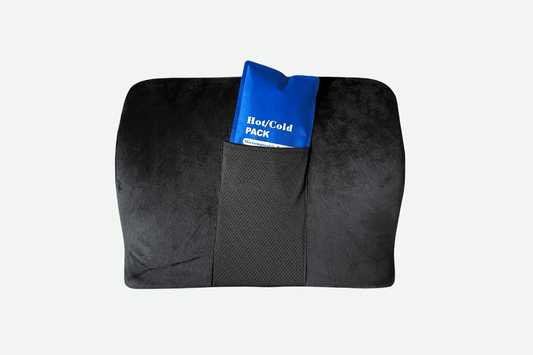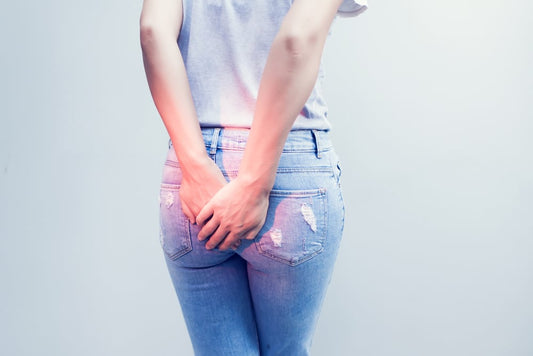Hemorrhoids During Pregnancy and the Best Way to Treat Them
Robert Cutler, D.O., FAOCPrShare
Hemorrhoids during pregnancy are a common inconvenience that can be managed with some time and care. This guide will help you minimize the uncomfortable, itchy, painful symptoms of pregnancy and postpartum hemorrhoids and give you tips to help lead you back to full anorectal health.
We will also talk briefly about hemorrhoids themselves, including what they are, why half of all pregnancies result in them, how to treat them, and (if you’ve had the foresight to read up on it) how best to prevent them from forming in the first place. This information helps to make sense of the practical tips I provide later.
As a practicing proctologist, I’ve spent more than 30 years treating many different anorectal conditions, hemorrhoids while pregnant included, and have figured out effective treatments and prevention strategies, so read on to learn more. If you have any questions after reading, send me a message through our customer portal.
What are Hemorrhoids?
A hemorrhoid is a blood vessel around the anus that can become swollen because of excess pressure or blood flow to the affected area. Hence, the most common causes of symptomatic hemorrhoids involve activities that increase pressure or boost blood flow to the anal area, such as weightlifting, straining on the toilet or even just sitting in the bathroom too long.
Why is straining related to hemorrhoids? These activities and more, all focus pressure and blood flow to your anus. This makes the veins in that area susceptible to swelling. If the vein that swells is inside your anus, that’s called an internal hemorrhoid. If the swollen vein is outside your anus, that’s an external hemorrhoid.
Once the vein is swollen, it can become itchy, uncomfortable or painful. External hemorrhoids are generally the problematic ones, most commonly associated with pain, swelling and burning, but it’s possible that internal hemorrhoids can be uncomfortable too. Internal hemorrhoids, when symptomatic, can cause bright red blood on toilet tissue.
Are hemorrhoids always a problem? Actually, hemorrhoids are a normal part of human anatomy (though researchers today aren’t certain of their function and some consider them vestigial). In fact, hemorrhoids that aren’t painful, itching or burning should receive preventative treatment to avoid complications in the future. This can prevent further swelling and stretching of skin (and to soothe the uncomfortable symptoms).
What Causes Hemorrhoids During Pregnancy?
What causes hemorrhoids during pregnancy? Pregnancy causes hemorrhoids due to the excess pressure exerted on, and added blood flow to, the bowel region during the gestation process. The added weight of a growing baby and increased blood flow can cause veins lining the rectum wall to swell into a hemorrhoid. These bodily changes happen to everyone, which is why 50% of women develop hemorrhoids during pregnancy.
The childbirth process itself can cause hemorrhoids too. As you push hard to deliver your baby, the excessive straining can cause the veins along the rectum wall to become swollen. So even if hemorrhoids don’t pop up during pregnancy, it’s possible to develop them in the postpartum period.
There are also secondary factors related to diet and lifestyle changes during pregnancy that cause flare-ups as well. As eating habits and digestion changes during pregnancy, so will your bathroom habits. Any dietary change affecting your bowel movement regularity can be a boon for hemorrhoids, as constipation and difficult bathroom breaks strain the bowels, adding pressure to the region.
And as you ease into a more sedentary lifestyle due to the added weight of and care for your growing baby, the lower activity level and longer periods of sitting can also cause hemorrhoid flare-ups. Sitting for long periods of time puts pressure on the veins in the bowel region of your body, and extra weight gained from inactivity can contribute as well.
How Can You Treat Hemorrhoids While Pregnant?
How do you treat hemorrhoids while pregnant? Hemorrhoids are likely to develop during pregnancy, but there are ways to try and prevent them, and there are tried and true ways to treat hemorrhoids if they do develop. I’ll use this section to explain both treatments and prevention strategies, because they go hand in hand in relieving symptoms.
Treatments include lifestyle changes, OTC products and home remedies, and I’ll go through them all. OTC and home remedies for hemorrhoids during pregnancy are best to immediately fight painful and irritating symptoms, and lifestyle changes are best to promote healing and reduce the duration of flare-ups.
Work on Kegel Exercises Regularly
Why are kegel exercises recommended for hemorrhoid prone people? Kegel exercises are a medically reviewed way to strengthen your pelvic floor to prevent rectal muscles from straining. If you’re already experiencing symptomatic hemorrhoids, be sure to start off easily so as not to put pressure on your already inflamed veins.
Take Warm Baths with Epsom Salts
Sitz baths are common hemorrhoid treatments that simply involve soaking the affected area in warm water. This can be done in a bathtub or in a special purpose sitz bath device that attaches to your toilet. A sitz bath device allows you to drop your butt into a purpose made bowl for soaking, as opposed to drawing a bath that you have to climb into.
In order to not only soothe symptoms but to speed up the healing process, add Epsom salts to the warm sitz bath water. This will add anti-inflammatory benefits to your soaking treatment that help calm hemorrhoids. Doctor Butler’s Epsom bath salts are made with essential oils that even help to counter hemorrhoid-causing problems like constipation by reducing inflammation.
Keep Moving and Don’t Sit for Too Long
Sitting in one position for too long puts pressure on your backside and bowel region. This excess pressure is what causes veins along the rectal wall to swell up and become painful hemorrhoids. Sitting for too long allows blood to pool near the anus, another hemorrhoid trigger. Avoid this by getting up at least once an hour to move around.
If you already have hemorrhoids, try a Memory Foam Seat Cushion to take some pressure off of your pelvic region. It also provides localized comfort to the anal region.
Stay Regular and Eat Plenty of Fiber
Constipation is a huge contributor to hemorrhoid flare-ups. People having difficult bowel movement tend to strain, which can cause hemorrhoids. The best way to avoid constipation is to make sure your diet consists of fibrous foods. If you want a crash course in high fiber diets, check out a previous post of mine on a High Fiber Diet for Hemorrhoids.
What foods are best for hemorrhoids? The Mayo Clinic recommends eating lots of fruits and vegetables and to ask your health care provider for a safe fiber supplement to add to your nutritional intake. You can visit the Mayo Clinic FAQ’s on hemorrhoids and pregnancy here.
Apply Witch Hazel Externally
Witch Hazel is an extremely popular and trustworthy pregnancy hemorrhoids treatment, both historically and today. It helps relieve itching and burning by targeting the mucus secretions of hemorrhoids with its natural anti-inflammatory and astringent properties. Many hemorrhoid specific OTC treatments are made with Witch Hazel, coming in wipe, spray and other topical forms.
You can find pure Witch Hazel at many drug stores, along with hemorrhoid treatments that combine the soothing and healing properties of Witch Hazel with other relieving ingredients. Doctor Butler’s Hemorrhoid Spray combines Witch Hazel with Aloe for its antiseptic and cooling properties in a no touch delivery system.
Sleep On Your Side
Why does sleeping on your side help treat hemorrhoids? Sleeping on your side will keep pressure off of your pelvic floor. This will help both hemorrhoids that are already there from staying inflamed, and help prevent further flare-ups.
Medically Treating Hemorrhoids in Pregnancy
There are medical solutions to problem internal and external hemorrhoids, ranging from the application of OTC ointments to surgery. Surgery is reserved for the most serious and chronic of cases where skin has been permanently stretched out. If pursuing any at-home remedies, still do let your doctor know about the treatment.
Whether pregnant or not, surgery is only advised for hemorrhoids that are causing prolapse, excessive bleeding or pain that will not resolve with ointments, lifestyle changes or in-office treatments. Speak to your doctor if you have chronic hemorrhoids that stay painful no matter how you try to remedy the problem.
If you notice you have external hemorrhoids, but they aren’t causing you any pain or irritation, then it’s actually recommended treating the internal hemorrhoids with medicine to help prevent further progression of the external hemorrhoids. If your hemorrhoids are painful however, try the methods discussed above as well as an ointment with Lidocaine and healing herbs to numb the area and promote healing like Doctor Butler’s Hemorrhoid Cream or protective Pregnancy Spray

What Are Some Tips for Preventing Hemorrhoids During Pregnancy?
While many bodily changes during pregnancy can’t be modified, like the weight you’re gaining as your baby grows and the added pressure that puts on your backside, there are some tips you can keep in mind to try and avoid hemorrhoids before and after childbirth.
- Drink lots of water, as that helps keep bowel movements regular.
- Eat a high fiber diet in order to stave off constipation and bathroom straining.
- Avoid straining on the toilet even if bowel movements are tough. Try to eat fibrous supplements or try sitz baths to help with constipation.
- Don’t sit on the toilet too long reading your favorite blogs ;)
- Try not to sit in general for too long. Stretch your legs at least once an hour
- Avoid too much pressure on the anus by changing sitting position.
- Do kegel exercises to keep your rectal muscles in shape.
- Don’t wipe too hard with toilet paper. Switch to wet wipes or a bidet if you are becoming irritated after using the bathroom.
The Bottom Line About Treating Hemorrhoids During Pregnancy
Half of women get hemorrhoids during pregnancy. That number is so high because the changes your body goes through while gestating are naturally contributing factors to hemorrhoids:
- Excess weight puts pressure on your bowels
- Blood is flowing through the veins in the rectal walls at a heightened capacity
These changes are necessary for a growing baby, but bad for a body susceptible to hemorrhoids. Make yourself as hemorrhoid-proof as possible by strengthening your rectal walls with kegel exercises, staying regular with high fiber foods and plenty of water, and taking as much weight off of your pelvic floor as possible by staying active and sleeping on your side.
If you already suffer with problematic hemorrhoids, they can be treated during pregnancy with topical medicine and sitz baths to relieve your symptoms. Doctor Butler’s Advanced Formula Hemorrhoid & Fissure Ointment fights symptoms while delivering healing herbs and essential oils that can keep you focused on attending to your baby and bodily needs during and after pregnancy. Be sure to discuss with your personal physician the use of all over the counter medications before using, while pregnant or nursing.


